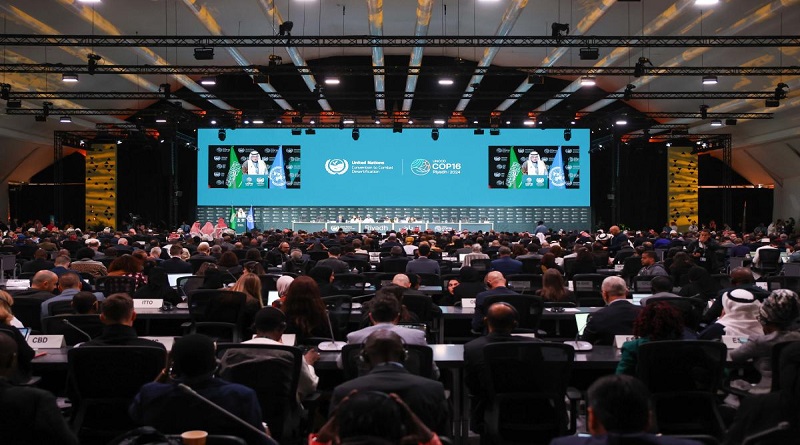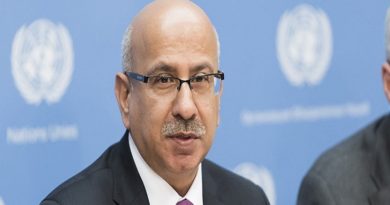UNCCD COP16 ushers a new era for rangelands, pastoralists
For centuries, rangelands and pastoralist communities have been the backbone of cultures, economies and ecosystems around the world.
Covering more than half of the Earth’s land surface, these vast landscapes support two billion people and contribute significantly to global food security and climate resilience. Yet they have remained largely invisible in international policy discussions, slowly degrading under the pressures of climate change, unsustainable land use and economic expansion.
At UNCCD COP16 in Riyadh, nations took a decisive step by adopting a decision on rangelands and pastoralists, marking an unprecedented commitment to protect these critical ecosystems and the people who depend on them. This commitment represents a fundamental shift, placing rangelands alongside forests and wetlands in global conservation efforts and ensuring that their role in climate resilience, biodiversity conservation and food security is fully recognized.
Rangelands and grasslands provide one-sixth of the world’s food supply and store nearly one-third of the planet’s carbon stocks in their deep-rooted soils. They are vital to smallholder herders, farmers and indigenous communities, yet more than 50 per cent of these ecosystems are now degraded.
As Ibrahim Thiaw, Executive Secretary of the United Nations Convention to Combat Desertification (UNCCD), warns, their decline is often overlooked: “When a forest is destroyed, the loss is visible and causes immediate concern. But rangeland degradation is silent, often unnoticed and undervalued.” He emphasizes the urgent need for global action to protect these landscapes before it is too late.
Beyond their economic significance, healthy rangelands stabilize soil, prevent erosion, regulate water cycles, enhance biodiversity, and store carbon – essential functions in the fight against climate change. Yet, despite their immense ecological value, these landscapes have historically received far less attention and funding than forests and wetlands.
Recognizing this oversight, the United Nations General Assembly has declared 2026 as the International Year of Rangelands and Pastoralists (IYRP), a global initiative designed to highlight the indispensable contributions of rangelands and pastoralist communities to our planet’s health and economies.
For the first time, UNCCD Parties adopted a decision to promote the sustainable management, restoration and conservation of rangelands – vast ecosystems used for grazing – ahead of COP17, which will be hosted by Mongolia in 2026.
Countries have pledged to improve pastoralists’ land rights by aligning with international guidelines, strengthening legal protections and ensuring access to rangelands. The decision also emphasizes the value of Indigenous and local knowledge in sustainable land management, recognizing the role of traditional pastoral practices in conserving these ecosystems for future generations. Commitments were made to mobilize public-private partnerships, establish biodiversity credits and develop innovative financing models to ensure long-term investment.
This pivotal shift ends decades of neglect and places rangelands at the centre of global sustainability efforts. It aligns with the Kunming-Montreal Global Biodiversity Framework and the UN Decade of Ecosystem Restoration and strengthens their integration into national biodiversity and climate strategies and action plans. With Mongolia set to host UNCCD COP17 in 2026, the global community has a unique opportunity to cement rangelands as a key focus of environmental policy. Plans are already underway to develop a UNCCD Flagship Initiative on Rangelands, which will foster international cooperation, secure large-scale funding for restoration, and facilitate knowledge sharing between scientists and pastoral communities.
However, systemic challenges remain. Conflicting land use policies, economic pressures and a lack of formal recognition of pastoralists’ rights continue to threaten rangeland sustainability. Many pastoralist communities face displacement due to land conversion, mining and large-scale agricultural projects that prioritize short-term economic gains over long-term ecosystem health. Addressing these issues requires an integrated approach that combines scientific research, policy reform and traditional land management.
“The commitments at UNCCD COP16 mark a turning point, but success depends on sustained collaboration. Governments must work closely with pastoralists and livestock value chain agents, conservation groups and financial institutions, to scale up investment through sustainable financing and innovative tools.” said Enrique Michaud co-chair of the IYRP Global Alliance. “Securing pastoralists’ land rights is crucial to prevent displacement and conflict, to ensure access to their traditional rangelands and to fortify the ecosystem services they provide.”
Sustainable rangeland and land-use planning must balance conservation efforts with the economic realities of pastoral livelihoods, promoting land management strategies that maintain ecosystem health while supporting local economies. Rangeland conservation must also be fully integrated into national and global climate adaptation strategies to ensure that these landscapes contribute to long-term resilience to climate change and desertification.
Ensuring rangeland sustainability is not just an environmental imperative – it is a necessity for climate security, food sovereignty and cultural preservation. As UNCCD Parties and partners prepare for COP17, the momentum generated at COP16 must be translated into real action.




